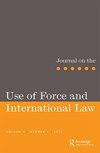当代国际法中同意使用武力的权力:克里米亚和也门冲突
Q3 Social Sciences
Journal on the Use of Force and International Law
Pub Date : 2019-01-02
DOI:10.1080/20531702.2019.1612152
引用次数: 3
摘要
摘要本文分析了在两个内部冲突的背景下,同意可以为禁止使用武力辩护的法律框架:2014年俄罗斯对克里米亚的干预和2015年以来沙特领导的对也门的干预。首先,它认为,合法政府的有效同意可能构成外国军事干预的法律理由,只要外国军事干预不干扰邀请政府的政治独立性,或构成“反干预”。其次,它发现在克里米亚和也门冲突中表面上都没有同意的权力,这意味着这些干预相当于禁止使用武力。第三,从对俄罗斯干预的广泛谴责和对沙特领导的国家实践和学术文献干预的广泛默许中,它发现了对干预合法性的矛盾解释。本文章由计算机程序翻译,如有差异,请以英文原文为准。
Authority to consent to the use of force in contemporary international law: the Crimean and Yemeni conflicts
ABSTRACT This article analyses the legal framework by which consent may justify a prohibited use of force in the context of two internal conflicts: Russia’s intervention in Crimea in 2014 and the Saudi-led intervention in Yemen since 2015. First, it contends that the valid consent of a legitimate government may constitute a legal justification for a foreign military intervention where it does not interfere with the political independence of the inviting government, or constitutes a ‘counter-intervention’. Secondly, it finds an ostensible absence of authority to consent in both the Crimean and Yemeni conflicts, which implies that the interventions amounted to a prohibited use of force. Thirdly, it discerns from the extensive condemnation of the Russian intervention and the widespread acquiescence to the Saudi-led intervention in state practice and the academic literature a paradoxical interpretation of the legality of the interventions.
求助全文
通过发布文献求助,成功后即可免费获取论文全文。
去求助
来源期刊

Journal on the Use of Force and International Law
Social Sciences-Law
CiteScore
1.10
自引率
0.00%
发文量
13
 求助内容:
求助内容: 应助结果提醒方式:
应助结果提醒方式:


